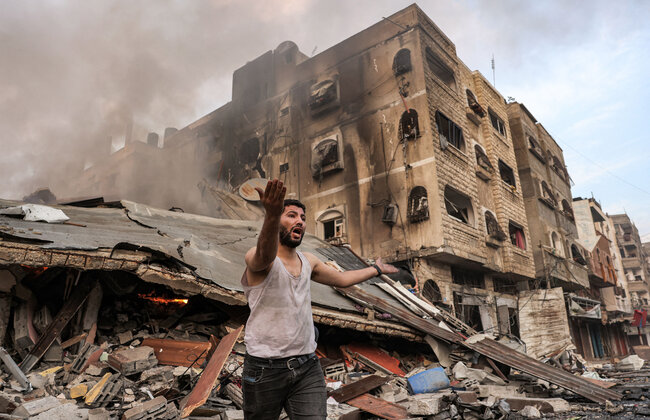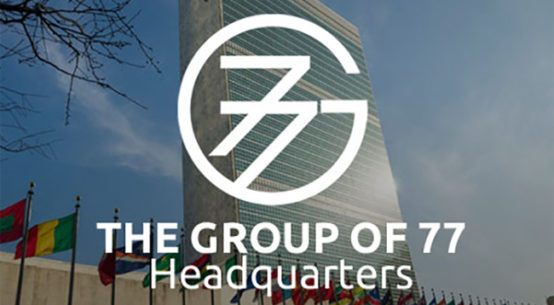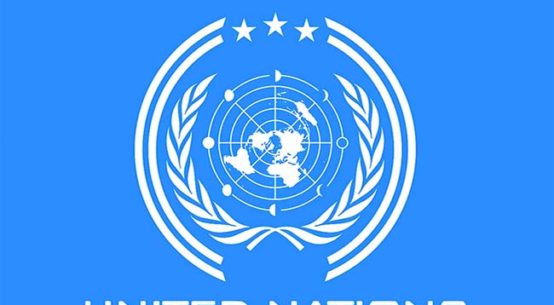
Resolution 2712 was approved in a context of widespread death and wholesale destruction unleashed by the conflict in Gaza and Israel.
According to Israeli authorities, more than 1,200 people were killed — including 33 children — and thousands were injured in the abhorrent acts of terror by Hamas on 7 October. Some 250 people were also abducted, including 34 children.
There are also numerous accounts of sexual violence during the attacks that must be vigorously investigated and prosecuted. Gender-based violence must be condemned. Anytime. Anywhere.
According to the de facto authorities, more than 14,000 people have been killed since the start of the Israeli military operations in Gaza. Tens of thousands of Palestinians have also been injured, with many more missing. In Gaza, more than two-thirds of those killed are reported to be children and women.
In a matter of weeks, a far greater number of children have been killed by Israeli military operations in Gaza than the total number of children killed during any individual year, by any party to a conflict since I have been Secretary-General – as clearly indicated in the annual reports on Children and Armed Conflict that I have submitted to the Council.
Over the past few days, the people of the Occupied Palestine Territory and Israel have finally seen a glimmer of hope and humanity in so much darkness.
It is deeply moving to see civilians finally having a respite from the bombardments, families reunited, and lifesaving aid increasing.
Resolution 2712 “demands that all parties comply with their obligations under international law, including international humanitarian law, notably with regard to the protection of civilians, especially children.”
It is clear that before the pause, we witnessed serious violations. Beyond the many civilians killed and wounded that I spoke of, eighty percent of Gaza’s people have now been forced from their homes.
This growing population is being pushed towards an ever-smaller area of southern Gaza. And, of course, nowhere is safe in Gaza. Meanwhile, an estimated 45 percent of all homes in Gaza have been damaged or destroyed.
The nature and scale of death and destruction are characteristic of the use of wide-area explosive weapons in populated areas, with a significant impact on civilians.
At the same time, rocket attacks on population centres in Israel by Hamas and other groups have continued – along with allegations of the use of human shields This is also inconsistent with international humanitarian law obligations.
I want to stress the inviolability of United Nations facilities which today are sheltering more than one million civilians seeking protection under the UN flag.
UNRWA shares the coordinates of all its facilities across the Gaza Strip with all parties to the conflict. The agency has verified 104 incidents that have impacted 82 UNRWA installations – 24 of which happened since the adoption of the resolution.
A total of 218 internally displaced people sheltering in UNRWA schools have reportedly been killed and at least 894 injured. In addition, it is with immense sadness and pain that I report that since the beginning of the hostilities, 111 members of our UN family have been killed in Gaza.
This represents the largest loss of personnel in the history of our organization. Let me put it plainly: Civilians – including United Nations personnel – must be protected.
Civilian objects – including hospitals – must be protected.
UN facilities must not be hit. International humanitarian law must be respected by all parties to the conflict at all times.
Security Council resolution 2712 calls “for urgent and extended humanitarian pauses and corridors throughout the Gaza Strip …to enable …full, rapid, safe, and unhindered humanitarian access.”
I welcome the arrangement reached by Israel and Hamas – with the assistance of the governments of Qatar, Egypt and the United States. We are working to maximize the positive potential of this arrangement on the humanitarian situation in Gaza.
The pause has enabled us to enhance the delivery of aid into and across Gaza. For example, for the first time since 7 October, an inter-agency convoy delivered food, water, medical supplies, and shelter items to northern Gaza – specifically to four UNRWA shelters in Jabalia camp.
Prior to this, minimal or no assistance had reached these locations – even as tens of thousands of people had crowded there for shelter. Also, for the first time, supplies of cooking gas entered Gaza where people waited in lines that extended for two kilometres.
In the south, where the needs are dire, UN agencies and partners have increased both the amount of aid delivered, and the number of locations reached.
I express my appreciation to the Government of Egypt for their contribution in making this assistance possible. But the level of aid to Palestinians in Gaza remains completely inadequate to meet the huge needs of more than two million people.
And although the total volume of fuel allowed into Gaza has also increased, it remains utterly insufficient to sustain basic operations. Civilians in Gaza need a continuous flow of life-saving humanitarian aid and fuel into and across the area.
Safe and unimpeded humanitarian access to all those in need is critical. Humanitarian partners carried out several medical evacuations from north to south Gaza, including to transport dozens of premature babies as well as spinal and dialysis patients from Shifa and Al-Ahli Anglican hospitals.
Several critically ill patients have also been evacuated for treatment in Egypt. Hospitals across Gaza lack the basic supplies, staff and fuel to deliver primary health care at the scale needed, let alone safely treat urgent cases.
The medical system has broken down under the heavy caseload, acute shortages, and the impact of hostilities.
Security Council resolution 2712 calls for “the immediate and unconditional release of all hostages held by Hamas and other groups.” The arrangement announced on 22 November has so far led to the release, over 5 days, of 60 hostages – 29 women, 31 children – held by Hamas and other groups since 7 October.
Outside the arrangement during the same period, another 21 hostages were released.
This is a welcome start. But as I have been saying from day one, all hostages must be released immediately and unconditionally.
Until then, they must be treated humanely and the International Committee of the Red Cross must be allowed to visit them. The arrangement also saw the release of 180 Palestinian prisoners and detainees from Israeli jails, mostly women and children.
Security Council resolution 2712 “calls on all parties to refrain from depriving the civilian population in the Gaza Strip of basic services and humanitarian assistance indispensable to their survival, consistent with international humanitarian law.”
Much, much more is required to begin to address human needs in Gaza. Water and electricity services must be fully restored. Food systems have collapsed and hunger is spreading, particularly in the north.
Sanitary conditions in shelters are appalling, with few toilets and sewage flooding, posing a serious threat to public health. Children, pregnant women, older people and those with weakened immune systems are at greatest risk.
Gaza needs an immediate and sustained increase in humanitarian aid including food, water, fuel, blankets, medicines and healthcare supplies. It is important to recognize that the Rafah border crossing does not have enough capacity, especially taking into account the slow pace of security procedures.
That is why we have been urging the opening of other crossings, including Kerem Shalom, and the streamlining of inspection mechanisms to allow for the necessary increase of lifesaving aid.
But humanitarian aid alone will not be sufficient. We also need the private sector to bring in critical basic commodities to replenish completely depleted shops in Gaza.
Finally, Security Council Resolution 2712 “underscores the importance of coordination, humanitarian notification, and deconfliction mechanisms, to protect all medical and humanitarian staff, vehicles, including ambulances, humanitarian sites, and critical infrastructure, including UN facilities.”
A humanitarian notification system is now in place, and is being constantly reviewed and enhanced, including through plans for additional civil-military experts to support coordination.
I welcome the adoption of resolution 2712 – but its implementation by the parties matters most. In accordance with the resolution, I will revert to the President of the Security Council with a set of options on effectively monitoring the implementation of the resolution.
I have already established a working group composed of the Department of Political and Peacebuilding Affairs, the Department of Peace Operations, the Office for the Coordination of Humanitarian Affairs, and the Office of Legal Affairs to urgently prepare proposals in this regard.
So far it is clear that implementation has been only partial at best, and is woefully insufficient. Ultimately, we know that the measure of success will not be the number of trucks dispatched or the tons of supplies delivered – as important as these are.
Success will be measured in lives that are saved, suffering that is ended, and hope and dignity that is restored. The people of Gaza are in the midst of an epic humanitarian catastrophe before the eyes of the world.
We must not look away. Intense negotiations are taking place to prolong the truce – which we strongly welcome — but we believe we need a true humanitarian ceasefire.
And we must ensure the people of the region finally have a horizon of hope – by moving in a determined and irreversible way toward establishing a two-State solution, on the basis of United Nations resolutions and international law, with Israel and Palestine living side-by-side in peace and security.
Failure will condemn Palestinians, Israelis, the region and the world, to a never-ending cycle of death and destruction.
Antonio Guterres, Secretary-General of the United Nations


